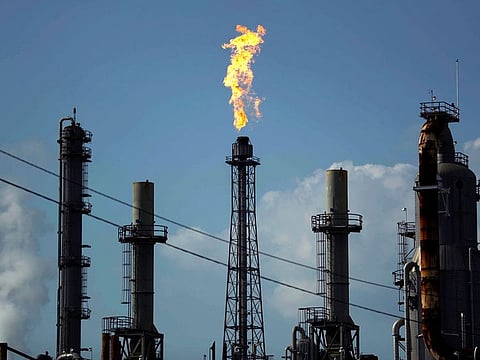Oil prices erase earlier spike as Israel-Iran conflict spares key infrastructure
Fears ease as Strait of Hormuz remains open and no major oil terminals are hit—for now

Dubai: Oil prices have started to fall again after a dramatic jump late last week — and it all comes down to one key fact: no major oil supply routes have been disrupted so far.
Crude markets initially surged on Friday after Israel launched airstrikes on Iran, targeting key nuclear and military sites. Prices for Brent oil — the global benchmark — spiked by more than 7% in just one day. But by Monday, that rally had reversed. Brent prices dropped by over 1%, erasing a large part of those gains.
Why the reversal?
Traders were closely watching whether the conflict would hit the region’s critical oil infrastructure. On Friday, Israel did hit Iran’s South Pars gas field — forcing a temporary halt in production. But so far, no crude oil export terminals have been damaged, and importantly, the Strait of Hormuz remains open.
The Strait of Hormuz is a narrow shipping route that handles nearly 20% of the world’s oil supply. If Iran were to block or restrict traffic there, it could send oil prices soaring. But analysts say that threat hasn’t materialized yet.
“There are no signs yet that a Hormuz blockage is on the cards,” said Mukesh Sahdev of Rystad Energy.
Oil prices still high
Despite Monday’s drop, oil prices are still trading above pre-attack levels. Many experts warn the situation is volatile and could turn quickly. According to RBC Capital Markets, the fact that both sides have already targeted energy infrastructure shows how real the risk is.
Morgan Stanley, for example, has already raised its oil price forecast by $10, citing the ongoing conflict.
Meanwhile, some shipping companies are avoiding the area altogether, citing safety concerns. This has driven up freight rates — particularly for supertankers traveling from the Middle East to Asia, where prices jumped by over 20% on Friday.
Bottom line?
Oil prices are falling for now — but the situation is still unpredictable. So far, the world’s key oil flows have remained untouched, and that's helping calm markets. But if Iran or others target major export routes like the Strait of Hormuz, prices could rise sharply again.
For now, expect oil markets to remain highly sensitive to every headline, with both upside and downside risks depending on how the conflict unfolds.
Sign up for the Daily Briefing
Get the latest news and updates straight to your inbox


